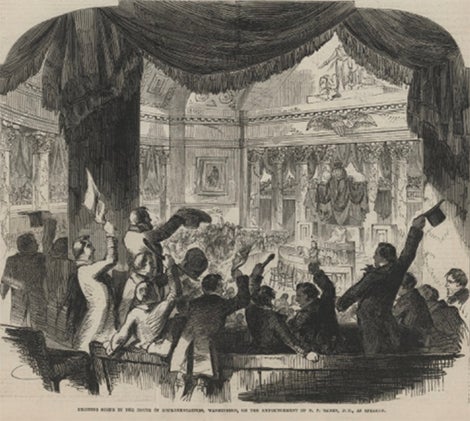So, we have been saved from a prolonged delay in getting a Speaker of the House elected. The late-night vote on Friday, Jan. 6 gave the office to Rep. Kevin McCarthy, a California Republican on the 15th ballot.
Opinion
As the national news has told us repeatedly, this is not the longest time it’s taken to get a speaker elected; on 14 occasions, it has taken more than one ballot to elect a speaker. Most of those occurred prior to the Civil War. Only once since, until McCarthy’s bid to become speaker, has the House had to vote more than once.
That was a century ago when congressmen would go through nine rounds of ballots across three days before electing Republican Frederick H. Gillett of Massachusetts. He would serve three terms.
The longest battle took place in 1855 when House members spent two months fighting over who would become the speaker. That was a particularly fractious time in American history. The Second Party System had fractured a few years earlier, and the anti-Catholic, nativist American party (Know Nothings) had arisen as the Whigs disintegrated.
The party system fracture was the product, at least partially, of the debate over expansion of slavery into the territories that had grown in importance since the Mexican War ended in 1848. When the 34th Congress assembled for the first time on Dec. 3, 1855, the first steps in the Bleeding Kansas violence were only days old, a product of the debates over expansion of slavery into the territories.
As its first action, the House needed to elect a speaker, but Congress was as fractured as the political system. Members had been elected from four political parties. Democrats held 82 seats; Know Nothings held 51; and a Northern anti-slavery party called the Opposition had the most seats, 100.
That fractiousness spilled over into the House speaker election. Sectional conflict over slavery and growing nativist sentiments fueled the conflict.
That December when the House convened, 21 members signaled interest in becoming Speaker. The early leader was Illinois Democrat William Richardson, but his party held a minority of seats compared to a coalition of Know Nothings and Opposition.

Anti-slavery members put forward 40-year-old second term Rep. Nathaniel Banks of Massachusetts. Banks, a former journalist who gave up the quill to became a lawyer, was a member of the American (Know Nothing) and Free Soil parties. He would be the final victor from a field of 20 contestants, but it would take two months and 133 ballots for him to win the speakership.
Horace Greeley’s New York Tribune ran an editorial on Dec. 29, 1855 that declared, “This is not a mere contest as to a Speaker of the House; it is but an incident in a long and arduous struggle which is to determine whether Slavery or Freedom shall be the pole star of our National career.”
Attempts to get a speaker elected went on through all of December, all of January 1856 and in February. In early February, another Democratic contender emerged, Rep. William Aiken Jr. of South Carolina. Aiken was one of South Carolina’s wealthiest men – his estate was worth more than $9 million in 2021 dollars, according to the Westegg Inflation Calculator.
Aiken owned a huge rice plantation on Jehossee Island that produced 1.5 million pounds of rice, and still produces nearly that much today. And, according to the 1860 Census Slave schedule, Aiken held more than 700 slaves. He’d served as governor in in the mid-1840s, and afterward was elected to the House. He was also a staunch Unionist who remained loyal to the United States throughout the Civil War.
Democrats in the House concocted a plan to elect the speaker by plurality; Aiken had enough support to win that way. On Feb. 2, another vote loomed, and hopes were high that this plan would get Aiken elected to the top spot in the House of Representatives.
Tennessee Democrat Samuel Smith introduced the plurality resolution, but members decided to take another vote first. Under the standing rules, Bank’s 103 votes were not enough to overcome Aiken’s 95. So, members voted on the plurality resolution, which passed. But that wasn’t enough to elect him. Under the plurality resolution, whomever won the most votes would become speaker. Aiken got 100. Banks, well, he kept 103 and became speaker thanks to the Democrats’ plurality resolution.
The moral of the story seems to be clever political ploys can have unintended consequences, which makes me wonder about some of McCarthy’s concessions. The 20 or so ultraconservative members, nicknamed the “chaos caucus” by Rep. Don Bacon of Nebraska, demanded concessions that would reduce the speaker’s power and make him vulnerable to easy ousting on a call from a single member. McCarthy also agreed to give the “chaos caucus” approval over some Rules committee appointments.
What will this mean for the functioning of the House? It depends on who you consult, but certainly the committee appointment provision signals potential for conflicts within the Rule committee. That committee controls what legislation comes to the House for vote. Conflict there could mean fewer bills get through for full House vote. Now that’s an interesting thought that warrants more pondering.









